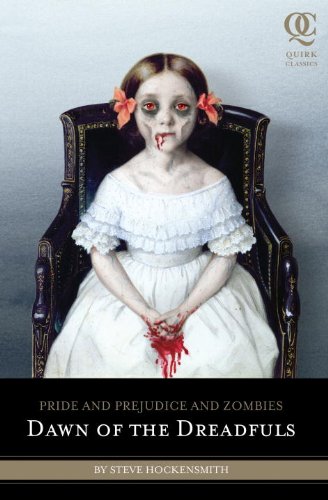
After reading Seth Grahame-Smith’s clever Jane Austen zombie mash-up, .com/articles/09/NW0900168.php>Pride and Prejudice and Zombies, I couldn’t wait to read more about the Bennet family’s quest to rid Longbourn of the unfortunate undead—but when I saw that a different author was taking the reins for the follow-up, I couldn’t help but feel a little bit apprehensive. After all, Ben H. Winters wasn’t nearly as successful with Sense and Sensibility and Sea Monsters. Fortunately for me, though, Steve Hockensmith’s Pride and Prejudice and Zombies: Dawn of the Dreadfuls is simply to die for.
There once was a time when all Elizabeth Bennet really cared about was Mrs. Goswick’s ball, when she would finally come out as a lady of Meryton. But then Mr. Ford climbed out of the coffin at his own funeral, and everything changed.
While the rest of Meryton brushes off the event as a fluke, Mr. Oscar Bennet knows better. A warrior in The Troubles of decades ago, he knows that they’ve become too complacent—and the zombies are back. He immediately races out to the greenhouse at Longbourn and returns it to its intended use, as a dojo.
With the help of handsome and mysterious young Master Hawksworth, the Bennet girls begin to learn their father’s zombie-fighting ways—but their unladylike behavior makes them outcasts in Meryton society. The only eligible man who hasn’t entirely shunned them is Lord Lumpley—but his plans for Jane might not be as honorable as they seem.
Like Pride and Prejudice and Zombies, Steve Hockensmith’s prequel, Dawn of the Dreadfuls, is riotously entertaining, filled with drama, romance, and plenty of undead action. This time, though, Hockensmith’s job was even more demanding—because he had to start from scratch. Instead of starting with a Jane Austen classic and simply adding the zombie parts, he had to create a completely new story—one that’s both faithfully Austen-like and amusingly zombie-filled. But Hockensmith clearly rose to the challenge—like so many unmentionables rising from the grave.
In writing Dawn of the Dreadfuls, Hockensmith clearly had a whole lot of fun. He plays with the themes and characters and storylines that made Jane Austen’s books beloved classics, yet he doesn’t make a mockery of them. Instead, as he says in the book’s dedication to Jane, “We kid because we love.” And he obviously loves Austen—because he carefully mimics her style, yet he refrains from turning the story into a big, wacky mess.
Though the story isn’t quite as romantic as the typical Austen classic, the feel is often the same. There are balls to prepare for and unfamiliar feelings about gentlemen to ponder. And although Hockensmith often exaggerates the characters’ personality traits (from sullen, overlooked Mary to the constantly tittering and gossiping Kitty and Lydia), fans of Austen’s Pride and Prejudice will easily recognize them—and appreciate Hockensmith’s interpretation. The writing style, too, feels authentic—yet not so authentic that 21st-century readers will struggle to decipher it.
Dawn of the Dreadfuls isn’t without its flaws—like the goofy Dr. Keckilpenny and the blatantly villainous Lord Lumpley (who lacks the mystery of a male Austen character)—but my complaints are minor ones. If you loved Pride and Prejudice and Zombies as much as I did, don’t miss the prequel. Then cross your fingers and hope that Hockensmith and his sorry stricken will return for a sequel.


